- Home
- Michael Swanwick
The Dragons of Babel Page 2
The Dragons of Babel Read online
Page 2
Will had no family other than his aunt. His parents had died on the very first day of the War. Theirs was the ill fortune of being in Brocielande Station when the dragons came and dropped golden fire on the rail yards. So Will had been shipped off to the hills to live with his aunt. Everyone agreed he would be safest there. That was several years ago, and there were times now when he could not remember his parents at all. Soon he would have only the memory of remembering.
As for his aunt, Blind Enna was little more to him than a set of rules to be contravened and chores to be evaded. She was a pious old creature, forever killing small animals in honor of the Nameless Ones and burying their corpses under the floor or nailing them above doors or windows. In consequence of which, a faint perpetual stink of conformity and rotting mouse hung about the hut. She mumbled to herself constantly and on those rare occasions when she got drunk - two or three times a year - would run out naked into the night and, mounting a cow backward, lash its sides bloody with a hickory switch so that it ran wildly uphill and down until finally she tumbled off and fell asleep. At dawn Will would come with a blanket and lead her home. But they were never exactly close. All this he told in stumbling, awkward words. The dragon listened without comment.
The cold had risen up to Will's armpits by now. He shuddered as it touched his shoulders. "Please...," he said. "Lord Dragon... your ice has reached my chest. If it touches my heart, I fear that I'll die."
"Hmmm? Ah! I was lost in thought." The needles withdrew from Will's arms. They were still numb and lifeless, but at least the cold had stopped its spread. Pins and needles tingled at the center of his fingertips, an early omen that sensation would eventually return.
The door hissed open. "You may leave now."
He stumbled out into the light.
An apprehension hung over the village for the first week or so. But as the dragon remained quiescent and no further alarming events occurred, the timeless patterns of village life resumed. Yet all the windows opening upon the center square remained perpetually shuttered and nobody willingly passed through it anymore, so that it was as if a stern silence had come to dwell within their midst.
Then one day Will and Puck Berrysnatcher were out in the woods, checking their snares for rabbits and camelopards (it had been generations since a pard was caught in Avalon, but they still hoped), when the Scissors-Grinder came putting down the trail. He lugged something bright and gleaming within his two arms.
"Hey, bandy-man!" Will cried. He had just finished tying his rabbits' legs together so he could sling them over his shoulder. "Ho, big-belly! What hast thou?"
"Don't know. Fell from the sky."
"Did not!" Puck scoffed. The two boys danced about the fat cobber, grabbing at the golden thing. It was shaped something like a crown and something like a birdcage. The metal of its ribs and bands was smooth and lustrous. Black runes adorned its sides, the like of which had never been seen in the village. "I bet it's a roc's egg or a phoenix's!"
Simultaneously Will asked, "Where are you taking it?"
"To the smithy. Perchance the hammermen can beat it down into something useful." The Scissors-Grinder swatted at Puck with one hand, almost losing his hold on the object. "Perchance they'll pay me a penny or three for it."
Daisy Jenny popped up out of the flowers in the field by the edge of the garbage dump and, seeing the golden thing, ran toward it, pigtails flying, singing. "Gimme-gimme-gimme!" Two hummingirls and a chimney-bounder came swooping down out of nowhere. And the Cauldron Boy dropped an armful of scavenged scrap metal with a crash and came running up as well. So that by the time the Meadows Trail became Mud Street, the Scissors-Grinder was red-faced and cursing, and knee-deep in children.
"Will, you useless creature!"
Turning, Will saw his aunt, Blind Enna, tapping toward him. She had a peeled willow branch in each hand, like long white antennae, that felt the ground before her as she came. The face beneath her bonnet was grim. He danced back from her, old enough to know better than to run, young enough to feel the urge anyway. "Auntie...," he said.
"Don't you 'auntie' me, you slugabed! There's toads to be buried and stoops to be washed. Why are you never around when it's time for chores?"
She put an arm through his and began dragging him homeward, still feeling ahead of herself with her wands.
Meanwhile, the Scissors-Grinder was so distracted by the children that he let his feet carry him the way they habitually went — through Center Square, rather than around it. For the first time since the coming of the dragon, laughter and children's voices spilled into that silent space. Will stared yearningly over his shoulder after his dwindling friends.
The dragon opened an eye to discover the cause of so much noise. He reared up his head in alarm. In a voice of power he commanded. "Drop that!"
Startled, the Scissors-Grinder obeyed.
The device exploded.
Magic in the imagination is a wondrous thing, but magic in practice is terrible beyond imagining. An unending instant's dazzlement and confusion left Will lying on his back in the street. His ears rang horribly and his body was strangely numb. There were legs everywhere - people running. And somebody was hitting him with a stick. No, with two sticks.
He sat up, and the end of a stick almost got him in the eye. He grabbed hold of it with both hands and yanked at it angrily. "Auntie!" he yelled. Blind Enna went on waving the other stick around, and tugging at the one he had captured, trying to get it back "Auntie, stop that!" But of course she couldn't hear him; he could barely hear himself through the din in his cars.
He got to his feet and put both arms around his aunt. She struggled against him, and Will was astonished to find that she was no taller than he. When had that happened? She had been twice his height when first he came to her. "Auntie Enna!" he shouted into her ear. "It's me, Will. I'm right here."
"Will." Her eyes filled with tears. "You shiftless, worthless thing. Where are you when there are chores to be done?"
Over her shoulder, he saw how the square was streaked with black and streaked with red. There were things that looked like they might be bodies. He blinked. The square was filled with villagers, leaning over them. Doing things. Some had their heads thrown back, as if they were wailing. But of course he couldn't hear them, not over the ringing noise.
"I caught two rabbits. Enna," he told his aunt, shouting so he could be heard. He still had them, slung over his shoulder. He couldn't imagine why. "We can have them for supper."
"That's good," she said. "I'll cut them up for stew while you wash the stoops."
Blind Enna found her refuge in work, She mopped the ceiling and scoured the floor. She had Will polish every piece of silver in the house. Then all the furniture had to be taken apart, and cleaned, and put back together again. The rugs had to be boiled. The little filigreed case containing her heart had to be taken out of the cupboard where she normally kept it and hidden in the very back of the closet.
The list of chores that had to be done was endless. She worked herself, and Will as well, all the way to dusk. Sometimes he cried at the thought of his friends who had died, and Blind Enna hobbled over and hit him to make him stop. Then, when he did stop, he felt nothing. He felt nothing, and he felt like a monster for feeling nothing. Thinking of it made him begin to cry again, so he wrapped his arms tight around his face to muffle the sounds, so his aunt would not hear and hit him again.
It was hard to say which — the feeling or the not — made him more miserable.
The very next day, the summoning bell was rung in the town square and, willing or no, all the villagers once again assembled before their king dragon. "Oh, ye foolish creatures!" the dragon said. "Six children have died and old Tanarahumra — he whom you called the Scissors-Grinder as well, because you have no self-discipline." Hag Applemere bowed her head." It is the truth." "You try my patience," the dragon said. "Worse, you drain my batteries. My reserves grow low, and I can only partially recharge them each day. Yet I see now that I da
re not be King Log. You must be governed. Therefore, I require a speaker. Somebody slight of body, to live within me and carry my commands to the outside."
Auld Black Agnes shuffled forward. "That would be me," she said. "I know my duty."
"No!" the dragon said scornfully. "You aged crones are too cunning by half. I'll choose somebody else from this crowd. Someone simple... a child."
Not me, Will thought wildly. Anybody else but me. "Him," the dragon said.
So it was that Will came to live within the dragon king. All that day and late into the night he worked drawing up plans on sheets of parchment, at his lord's careful instructions, for devices very much like stationary bicycles, which could be used to recharge the dragon's batteries. In the morning, he went to the blacksmith's forge at the edge of town to command that six of the things be immediately built. Then he went to Auld Black Agnes to tell her that all day and every day six villagers, elected by lot or rotation or however else she chose, were to sit upon the devices pedaling, pedaling, all the way without cease from dawn to sundown, when Will would drag the batteries back inside.
Hurrying through the village with his messages there were easily a dozen packets of orders, warnings, and advices that first day — Will's feet spurned the dust beneath them. Lack of sleep gifted everything with an impossible vividness. The green moss on the skulls stuck in the crotches of forked sticks lining the first half-mile of the River Road, the salamanders languidly copulating in the coals of the smithy forge, even the stillness of the carnivorous plants in his auntie's garden as they waited for an unwary toad to hop within striking distance — such homely sights were transformed, everything was new and strange to him.
By noon, all the dragon's errands were run, so Will went out in search of friends. The square was empty, of course, and silent. But when he wandered out into the lesser streets, his shadow short beneath him, they were empty as well. A lonely breeze whispered and tickled its way past him and was gone. Then he heard the high sound of a girlish voice and followed it around a corner.
There was a little girl playing at jump rope and chanting:
"Here-am-I-and All-a-lone; What's-my-name? It's-Jumping—"
"Joan!" Will cried.
lumping Joan stopped. In motion, she had a certain kinetic presence. Still, she was hardly there at all. A hundred slim braids exploded from her small, dark head. Her arms and legs were thin as reeds. The only things of any size at all about her were her luminous brown eyes. "I was up to a million!" She stamped a tiny foot. "Now I'll have to start all over again."
"When you start again, count your first jump as a million and one."
"It doesn't work that way and you know it! What do you want?"
"Where is everybody?"
"Some of them are fishing and some are hunting. Others are at work in the fields. The hammermen, the tinker, and the Sullen Man are building bicycles-that-don't-move to place in Tyrant Square. The potter and her `prentices are digging clay from the riverbank. The healing-women are in the smoke-hutch at the edge of the woods with Puck Berrysnatcher."
"Then that last is where I’ll go. My thanks, wee-thing."
Jumping Joan, however, made no answer. She was already skipping rope again, and counting "A-hundred-thousand-one, a-hundred-thousand-two..."
The smoke hutch was an unpainted shack built so deep in the reeds that whenever it rained it was in danger of sinking down into the muck and never being seen again. Hornets lazily swam to and from a nest beneath its eaves. The door creaked noisily as Will opened it.
As one, the women looked up sharply. Puck Berrysnatcher's body was a pale white blur on the shadowy ground before them. The women's eyes were green and unblinking, like those of jungle animals. They glared at him wordlessly. "I w-wanted to see what you were d-doing," he stammered.
"We are inducing catatonia," one of them said. "Hush now. Watch and learn."
The healing-women were smoking cigars over Puck. They filled their mouths with smoke and then, leaning close, let it pour down over his naked, broken body. By slow degrees the hut filled with bluish smoke, turning the healing-women to ghosts and Puck himself into an indistinct smear on the dirt floor. He sobbed and murmured in pain at first, but by slow degrees his cries grew quieter, and then silent. At last his body shuddered and stiffened, and he ceased breathing.
The healing-women daubed Puck's chest with ocher, and then packed his mouth, nostrils, and anus with a mixture of aloe and white clay. They wrapped his body with a long white strip of linen.
Finally they buried him deep in the black marsh mud by the edge of Hagmere Pond.
When the last shovelful of earth had been tamped down, the women turned as one and silently made their way home, along five separate paths.
Will stared after them until his stomach rumbled, reminding him that he hadn't eaten yet that day. There was a cherry tree not far away whose fruit was freshly come to ripeness, and a pigeon pie that he knew of which would not be well-guarded.
Swift as a thief, he sped into town.
Will stayed out as late as he dared, creeping back into the dragon's hulk just after sundown, fearful of the great Worm's certain fury. But when he sat down in the leather couch and the needles slid into his wrists, the dragon's voice was a murmur, almost a purr. "How fearful you are! You tremble. Do not be afraid, small one. I shall protect and cherish you. And you, in turn, shall be my eyes and ears, eh? Yes, you will. Now. let us see what you learned today." "I—"
"Shussssh." the dragon breathed. "Not a word. I need not your interpretation, but direct access to your memories. Try to relax. This will hurt you the first time, but with practice it will grow easier. In time, perhaps, you will learn to enjoy it."
Something cold and wet and slippery slid into Will's mind. A coppery foulness filled his mouth. A repulsive stench rose up in his nostrils. Reflexively, he retched and struggled.
"Don't resist. This will go easier if you open yourself to me."
More of that black and oily sensation poured into Will, and more. Coil upon coil, it thrust its way inside him. He found himself rising up into the air, above the body that no longer belonged to him. He could hear it making choking noises.
"Take it all."
It hurt. It hurt more than the worst headache Will had ever had. His skull must surely crack from the pressure. Yet still the intrusive presence pushed into him, its pulsing mass permeating his thoughts, his senses, his memories. Swelling them. Engorging them. And then, just as he was certain his head must explode from the pressure, it was done.
The dragon was within him.
Squeezing shut his eyes, Will saw, in the dazzling, pain-laced-darkness, the dragon king as he existed in the spirit world: sinuous, veined with light, humming with power. Here, in the realm of ideal forms, he was not a broken, crippled thing, but a sleek being with the beauty of an animal and the perfection of a machine.
"Am I not beautiful?" the dragon crooned. "Am I not a delight to behold?"
Will gagged with pain and disgust. And yet — might the Seven forgive him for thinking this! — it was true.
2
King Dragon
Every morning at dawn Will dragged out batteries weighing almost as much as himself into Tyrant Square for the villagers to recharge — one at first, then more and more as the remaining six standing bicycles were built. One of the women, chosen by rotation, would be waiting to give him breakfast. As the dragon's agent, he was entitled to go into any hut and feed himself from what he found there, but the dragon deemed this method more dignified. The rest of the day, by order of his master, he spent wandering through the village and. increasingly, the woods and fields around the village, observing. At first Will did not know what he was looking for. But by comparing the orders he transmitted with what he had seen the previous day, he slowly managed to piece it together that he was scouting out the village's defensive position, discovering its weaknesses, and looking for ways to alleviate them.
The village was. quite simply, not defe
nsible from any serious military force. But it could be made more obscure. Thorn hedges were planted, and poison oak. Footpaths were eradicated. A clear-water pond was breached and drained, lest it be identified as a resource for advancing armies. When the weekly truck came up the River Road with mail and cartons of supplies for the store, Will was loitering at the magazine rack to ensure that nothing unusual caught the driver’s eye. When the bee warden declared a surplus of honey that might be sold downriver for silver, Will relayed the dragon's instructions that half the overage be destroyed, lest the village get a reputation for prosperity.
At dimity, as the sunlight leached from the sky, Will would feel a familiar aching in his wrists and a troubling sense of need, and return to the dragon's cabin to lie in painful communion with him and share what he had seen.
Evenings varied. Sometimes he was too sick from the dragon's entry into him to do anything. Other times he spent hours scrubbing and cleaning the dragon's interior. Mostly though, he simply sat in the pilot's couch, listening while the dragon talked in a soft, almost inaudible rumble, saying things that were in themselves a kind of torture for, true or not, they could not be denied.
"You don't have cancer," the old war-drake murmured. It was, if the clock on the control panel could be believed, dark outside. By policy however, the hatch was kept closed tight and there were no windows so, whatever the time, the only light came from the instrumentation. "No bleeding from the rectum, no loss of energy. Eh, boy?"
"No, dread lord."
"It seems I chose better than I suspected. You have mortal blood in you, sure as moonlight. Your mother was no better than she ought
to be." "Sir?"
"I said your mother was a whore! Are you feebleminded? Your mother was a whore, your father a cuckold, you a bastard, grass green, mountains stony, and water wet."
"My mother was a good woman!"
"Good women sleep with men other than their husbands all the time, and for more reasons than there are men. Didn't anybody tell you that? She could have been bored, or reckless, or blackmailed. She might have wanted money, or adventure, or revenge upon your father. Perchance she bet her virtue upon the turn of a card. It could be she was a worshiper of the Horned Man. Mayhap she was overcome by the desire to roll in the gutter and befoul herself. She may even have fallen in love. Unlikelier things have happened."

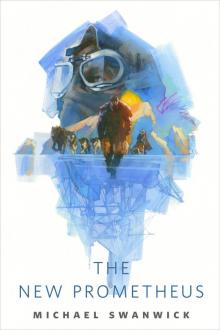 The New Prometheus
The New Prometheus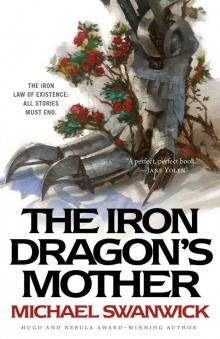 The Iron Dragon’s Mother
The Iron Dragon’s Mother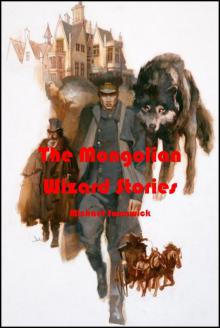 The Mongolian Wizard Stories
The Mongolian Wizard Stories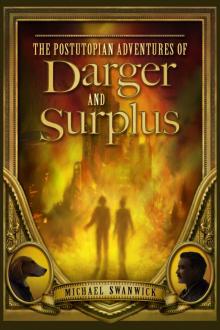 The Postutopian Adventures of Darger and Surplus
The Postutopian Adventures of Darger and Surplus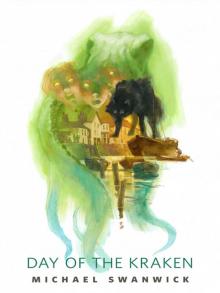 Day of the Kraken
Day of the Kraken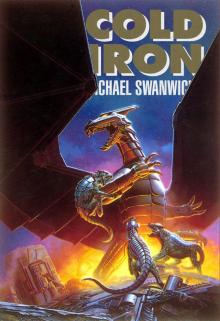 Cold Iron
Cold Iron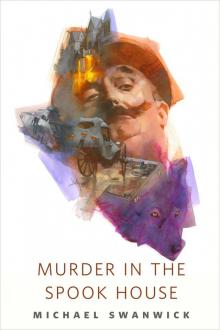 Murder in the Spook House: A Tor.com Original
Murder in the Spook House: A Tor.com Original Radio Waves
Radio Waves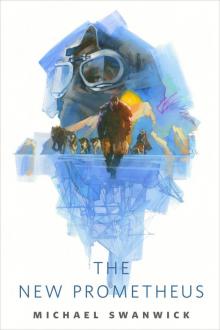 The New Prometheus: A Tor.com Original
The New Prometheus: A Tor.com Original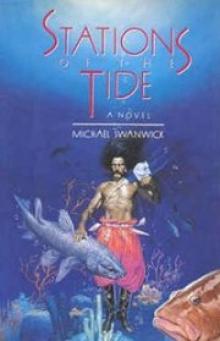 Stations of the Tide
Stations of the Tide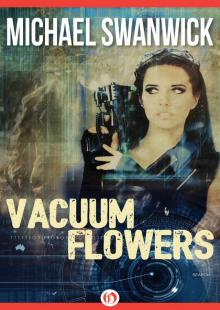 Vacuum Flowers
Vacuum Flowers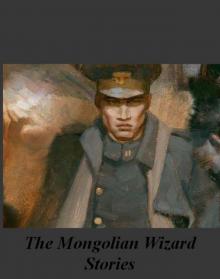 The Mongolian Wizard Stories (online stories 1-7)
The Mongolian Wizard Stories (online stories 1-7)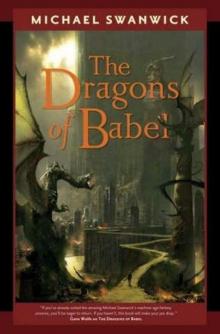 The Dragons of Babel
The Dragons of Babel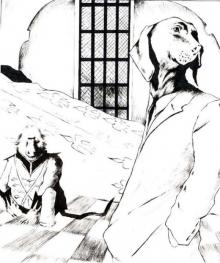 The Dog Said Bow-Wow
The Dog Said Bow-Wow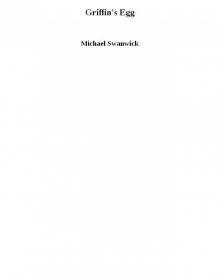 Griffin's Egg
Griffin's Egg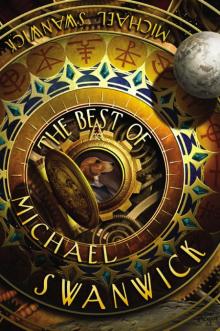 The Best of Michael Swanwick
The Best of Michael Swanwick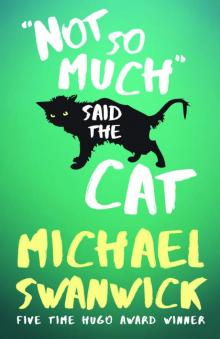 Not So Much, Said the Cat
Not So Much, Said the Cat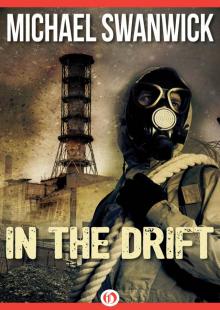 In the Drift
In the Drift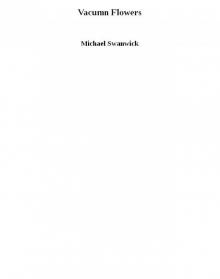 Vacumn Flowers
Vacumn Flowers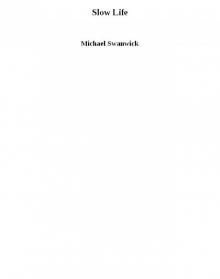 Slow Life
Slow Life The Wisdom Of Old Earth
The Wisdom Of Old Earth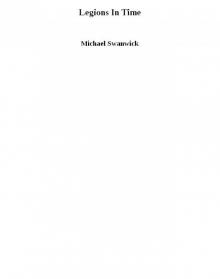 Legions In Time
Legions In Time Scherzo with Tyrannosaur
Scherzo with Tyrannosaur The Year's Best Science Fiction (2008 Edition)
The Year's Best Science Fiction (2008 Edition)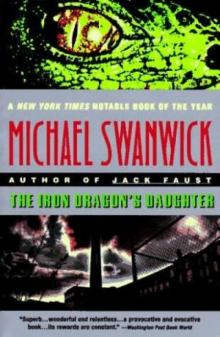 The Iron Dragon's Daughter
The Iron Dragon's Daughter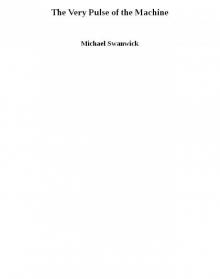 The Very Pulse of the Machine
The Very Pulse of the Machine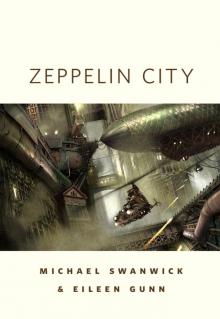 Zeppelin City
Zeppelin City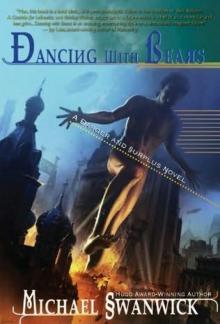 Dancing with Bears
Dancing with Bears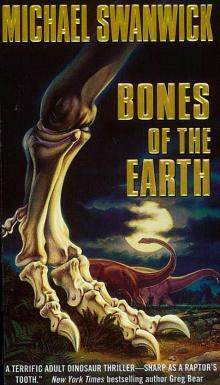 Bones of the Earth
Bones of the Earth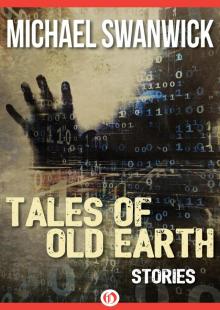 Tales of Old Earth
Tales of Old Earth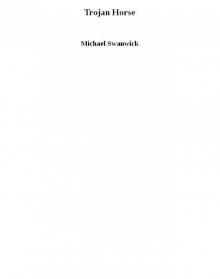 Trojan Horse
Trojan Horse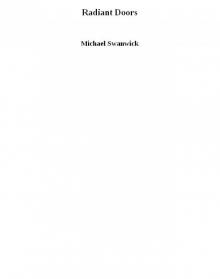 Radiant Doors
Radiant Doors